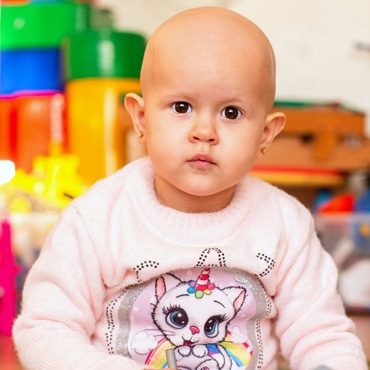


When you find out that your child has cancer, the first thing you want to do is run away, disappear, hide. At such moments, we feel helpless and vulnerable. It seems that we cannot cope with this and that this is the worst thing that can happen...
How can a family get out of this state, how can they communicate with each other and live during this difficult period, and is it even possible to live "normally" when your child is seriously ill?
Alla Antonova, a psychologist at the foundation, talks about the psychology of relationships within the family and recommendations on how to build them correctly.

The desire to hide is related to the unwillingness to show weakness. Unfortunately, in our society, expressing emotions is a sign of weakness. "Tears will not help grief", "Don't cry, be strong!", "You can't burden others with your feelings". We live in a world with prejudices that manifest themselves in family relationships.
How can you pretend that everything is fine when everything is bad?
"I wanted to cry and cry all the time," one mother admits, "but I didn't cry, I hid everything. My husband says I became stony.
One can imagine the mental strength it takes to drown out all life in oneself.
If we have emotions and the ability to cry, it means we need it. All of this is given to us to make our experiences easier. So why is it bad then? Just because it's ugly? Uncomfortable for others? Does it not fit into the world of strangers?
To get better, the first thing you need to allow yourself is to grieve as much as you need to. When you're sad and hurt, it's okay to be sad, angry, and cry. Allow yourself to express all of these things without any conditionality.
"I would go to the sea and scream," my father admits, "and I would feel better.
"I used to hit the pillow all the time and then cry into it," says my mother.
What about smiling and being happy? What about these emotions? Will we be judged if we try to live a normal life? Doing manicures, watching football, wearing nice clothes, seeing friends. Is all of this normal when we have a seriously ill child who we may lose?
Children are very sensitive. Watching their parents, on whom they depend, they read changes in their mood. So if we are sad, they are sad too. And vice versa: if mom is well-groomed, smiling, and dad is joking as usual, life goes on. And if my mom is not able to take care of herself, how will she cope with me? This is how children think and feel in our condition.
Once, while helping a mother with a seriously ill boy, we started a dialog after sharing a funny story with them. Neither the mother nor the boy smiled then.
- "Is it a funny story?" we ask the boy who was always looking at his mother.
- Yes.
- Why didn't you smile?
- Because my mom is sad. And if I smiled, she would think I was having fun. But I'm sad even when I smile.
A human being is a complex creature. He is ready to experience a range of different emotions at the same time. It is normal to smile, enjoy the little things, and joke, even when you are anxious and sad. Where else can you get the resource to live on if not in joy?
In difficult times, it is vital to focus on what your child, you and your family are feeling. That is all that matters.
When your child smiles at your new dress, isn't that more important than the opinion of a stranger who somehow thinks that pleasing yourself and your child is a sin. It is despair that is a sin, isn't it?
 Few parents of a child with cancer know what they are really going to go through. Yes, they are ready to fight and win after they have recovered from the shock. But hyperactivity is a poor helper in a long and complicated treatment. Such an overly optimistic attitude is an illusion and an unwillingness to see the real picture, which is dangerous in a situation where it is important not to waste time. Disappointment can make you weak and depressed.
Few parents of a child with cancer know what they are really going to go through. Yes, they are ready to fight and win after they have recovered from the shock. But hyperactivity is a poor helper in a long and complicated treatment. Such an overly optimistic attitude is an illusion and an unwillingness to see the real picture, which is dangerous in a situation where it is important not to waste time. Disappointment can make you weak and depressed.
When building your intra-family relationships in a difficult period, it is important to correctly calculate your strength and develop a step-by-step action plan. To do this, you need to accept everything as it is. Denying it, looking for someone to blame, and even more so blaming yourself is a huge drain on precious time that could be spent looking for a doctor, a clinic, learning about the disease itself and how to treat it.
In order to calculate your strength and develop an action plan, it is important to accept everything as it is, without exaggerating or downplaying the problem.
The best thing to do as a family is to recognize that it happened and that it is not the fault of any family member. By being honest with each other and ourselves, there is no need to play the role of super strong and confident parents. You don't have to be ashamed of tears and your vulnerability. You can be frank and sincere, speaking directly about what is bothering you whenever it is necessary. Such truth restores and strengthens family relationships and gives you the strength to get through difficult times.
From time to time, a person needs to be alone to focus, think, hear themselves or reboot. But when sadness overwhelms the soul, loneliness is not an option, but only a serious obstacle to the child's recovery. "Being together" is a basic condition for successful treatment, which requires a lot of time and effort.
By secluding herself and completely dissolving in her sick child, the mother starts a chain of similar "seclusions" of people close to her. This destroys even the strongest relationships within the family. As a result, there is no family. Everyone grieves alone and looks for a place to be alone elsewhere.
The reluctance to talk to family and friends is also related to the same illusion mentioned above. It seems that if you do not discuss the disease with others, it will disappear faster. And if everyone talks about it casually, it means that everyone has recognized that everything is bad. It is true, everything is bad. But this does not mean that there is no hope. There is hope - just look at the statistics.
The sooner the family gets together to hug, look into each other's eyes, talk about everything without hiding anything, the more chances a child who needs strong support has for recovery.
Each family has its own peculiarities of communication. Some people quarrel constantly, while others have no one at all. What do you do when you're alone with a problem?
First, family psychologists are ready to help with a child's illness. They are not only ready to listen, but also help a person see what he or she had not noticed before. Such conversations often lead to the following dialog:
- No one helps me, I have no one at all. I'm on my own.
- Who did you just talk to on the phone?
- This is my friend, she calls me often.
- This means that you do have someone. Someone who cares about you, who supports you.
- Yes, it turns out that there are...
There is always someone who is ready to listen to you. To realize this, you need to allow yourself to express your feelings, open up, and take the first step yourself. When you talk about your pain to another person, it helps you get out of your numbness and see the situation from a different angle.

Every family has its own path. For some it is harder, for others it is easier, for others it ended tragically. And yet, every time, families who have survived their child's treatment admit that this part of life has helped them better understand what they really want and what is truly valuable to them.
Psychological support hotline fromPledges» the number 0 800 4000 23 is available: